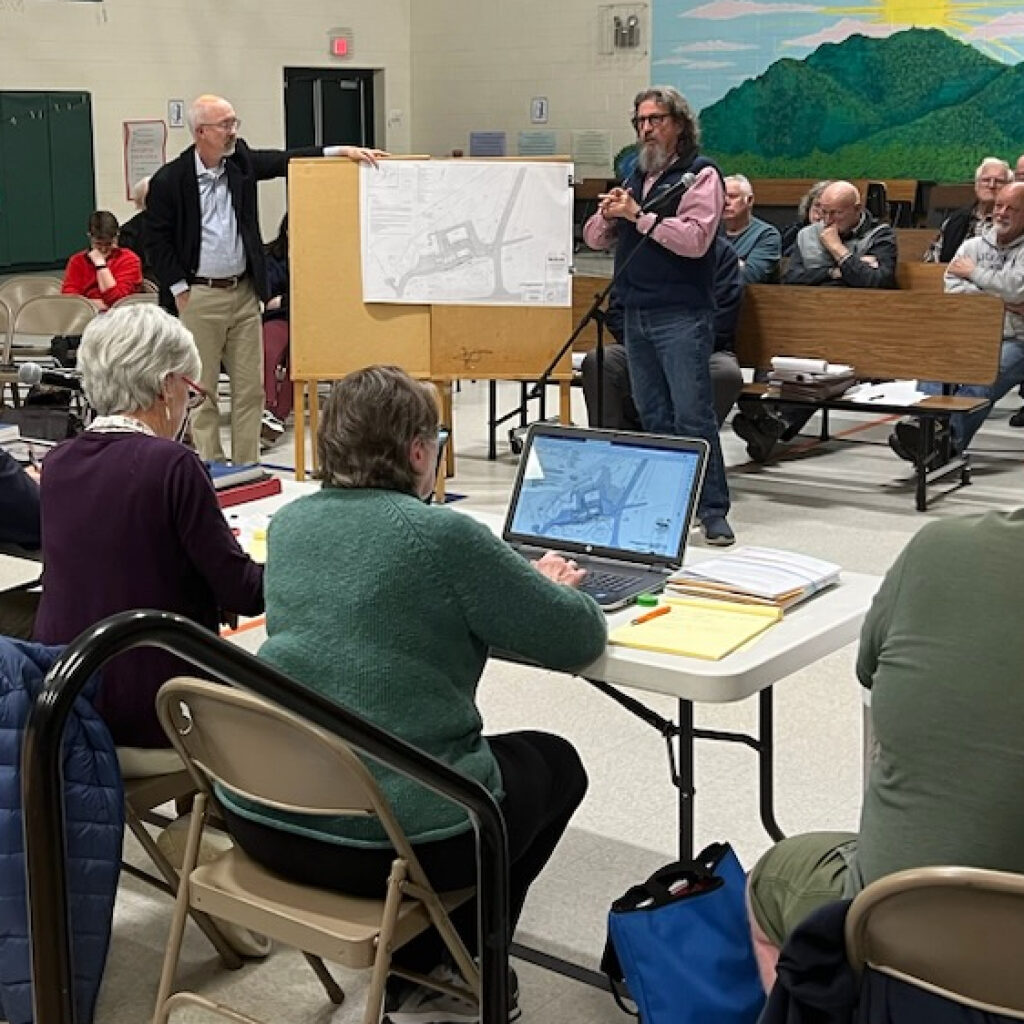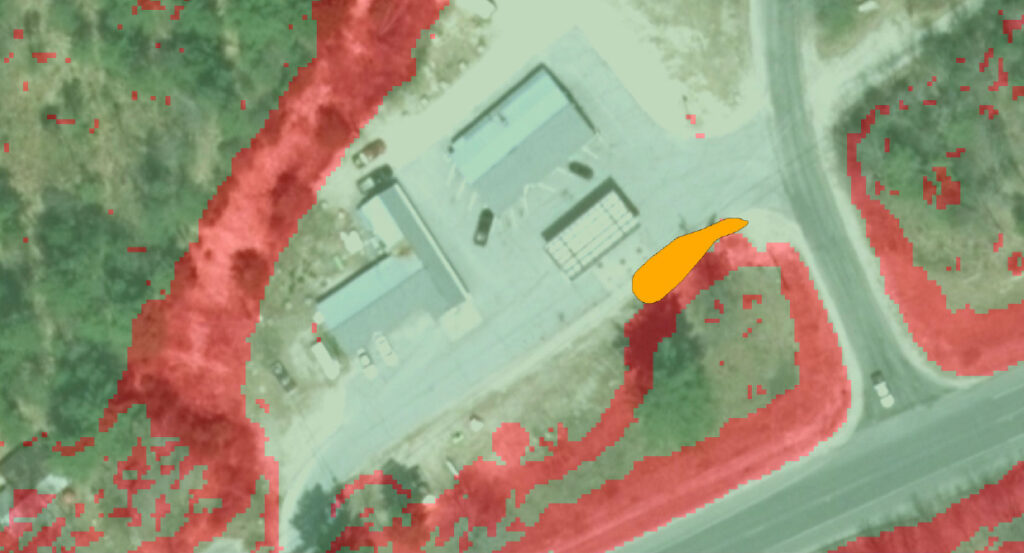Effingham—May 29, 2023—Conway developer Meena LLC’s latest plan for a gas station in Effingham’s Groundwater Protection District fails to protect the public’s health, safety and welfare in four critical ways and must be rejected, according to geoscientist Dr. Robert Newton.
In an eight-page report submitted to Effingham’s Planning Board, Newton said the location of the underground gasoline storage tanks and the design of the bioretention basin, whose purpose is to address contaminated stormwater runoff, do not meet state requirements.
In addition, hydrologic modeling of the proposed stormwater drainage system shows it will fail in a ten-year storm, and a number of required plan components, including those related to the diesel gas pumps, do not meet state or local regulations.
Calling the Meena property “the most sensitive recharge area of the Ossipee Aquifer,” Newton, who has studied and written about the geology of the region for decades, said his company, Geoscience Solutions LLC, is advising Ossipee residents Bill Bartoswicz and Tammy McPherson, who are abutting residential property owners.
The Planning Board asked Newton for his assessment of the plan in the wake of its May 17 hearing, at which a request for the scientist to speak at the next hearing in June was opposed by Meena attorney Matthew Johnson, who said Newton had “zero relevant experience” and “no standing to speak.”
Newton, who was in the audience but was not planning to speak that night, was asked by Board Chair George Bull if he wanted 15 minutes to respond. Agreeing to do so, Newton summarized his concerns about the site, and said he believed elements of the plan would be illegal if approved by the board.
That prompted a heated outburst from Meena agent Mark Lucy of Horizons Engineering, who called Newton’s claim “reckless.”
“After hearing that, I question what else from Dr. Newton you can believe,” Lucy said.
Board Chair Bull ended the confrontation by inviting Newton to submit his assessment of the plan in writing by May 24, and giving Meena until June 2 to respond to Newton.

Meena agents Matthew Johnson and Mark Lucy at the May 17 hearing. The two questioned the credibility of geoscientist Newton, telling the board he had “no standing.” Contributed Photo
Public Water Supply Well
One of the issues Newton identified in his report to the board is the Public Water Supply well on the property, which serves the currently-shuttered convenience store and the site’s residential apartments.
The state requires that new installations of Underground Gasoline Storage Tanks (USTs) be located more than 500 feet from a Public Water Supply well. Meena’s plan has the tanks less than 200 feet distant from the well. Abutter Bill Bartoswicz’s well is 300 feet away.
Newton said DES documents show that the USTs from a previous gas station at the site were removed eight years ago with state funds and state supervision, and in accordance with state regulations for the permanent closure of UST facilities.
The property’s previous UST site, known as a “grave,” is listed as “Permanently Closed” in the state’s OneStop database, meaning a new installation of USTs must comply with the 500-foot set-back, Newton said.
Bioretention Basin Plan
After Meena’s plan to funnel untreated gas station runoff onto adjacent state-owned land was rejected by the Department of Transportation, the developer proposed a plan to treat runoff in an oil/water separator and send it to a bioretention basin to be slowly released into the soil.
In his report, Newton said there are four ways in which Horizon Engineering’s bioretention basin plan does not conform to state regulation Env-Wq 1507.02, “Criteria for Permanent Methods for Protecting Water Quality.”
For one thing, the proposed location is partially in the permanently closed UST “grave,” meaning water from the basin could cause the release of the gas station contaminants DES found in the soil and documented during the 2015 closure process.
Second, bioretention basins are required to be at least 50 feet from steep slopes, defined as slopes having a gradient greater than 15%. The proposed basin is “located directly adjacent” to slopes that exceed that limit and approach 58%, “the angle of repose for sand,” Newton said.
Third, Env-Wq 1508.07 states that bioretention basins are not allowed in areas of “hydrologic soil group A” soils without an impermeable barrier, and the proposed bioretention basin is not designed with an impermeable barrier.

Meena’s proposed bioretention basin, in orange, is adjacent to steep slopes, in red, and is within a High Load Area, both of which would violate state regulations.
“Most significantly,” Newton wrote, the basin design violates Env-Wq 1507.02’s prohibition against the use of infiltration and filtering practices in High Load Areas, “including but not limited to groundwater protection areas where the stormwater comes from one or more areas where petroleum products are dispensed or otherwise transferred for commercial or industrial purposes.”
The Meena property is a High Load Area and is in the town’s Groundwater Protection District.
“As designed, Newton wrote, “the proposed basin is specifically prohibited from being located at this site.”
Additional Issues
Newton also took issue with Horizons Engineering’s estimates for stormwater flow. Matching Horizons’ HydroCAD (stormwater runoff modeling) and his own LiDAR (3D scanning) data, Newton said the plan’s “subcatchment divides” and boundaries do not conform well to the plan’s contour lines, resulting in Meena underestimating the amount of runoff that would flow through the stormwater system.
Newton said the modeling shows the stormwater system would be unable to handle runoff from a 10-year storm event, which means that it would also fail in 25- and 50-year storms. In that case, contaminated runoff would overflow the system and be carried toward protected wetlands and Phillips Brook, which empties into Ossipee Lake.
Since the site is a High Load Area, Newton said the state’s Stormwater Management Guidelines require a canopy over all fueling areas. He said the current plan—as well as the five previously submitted plans—do not show a canopy over the diesel fueling area. Moreover, he said the diesel pumps appear to be closer than 15 feet from the apartment building, which would violate Effingham’s zoning regulations.
The Planning Board said Meena and its agents would have until June 2 to submit a written reply to Newton’s report. The assessments will be part of the June 6 continued public hearing on the application at the town’s Elementary School at 6:30 p.m.
Newton’s full report may be read at https://bit.ly/robertnewtonreport.

If the dire warnings of a qualified Geoscientist are ignored by the Effingham officials charged with protecting the public and approve the Meena LLC project they will have failed in their primary duty to maintain the clean and safe drinking water for all who rely on it.
Health pre-empts profit.
For anyone who is unsure of proximity, of all the hoopla associated with this proposed gasoline/chemical dispensing company, please watch this video. You will wonder why anyone could ever support this project so very close to the Heart of Life in these mountains. Please watch.
https://youtu.be/I-wjQrXuRW8
Must have been 500 to a 1000 boats on ossipee lake last weekend, wonder how much gas spill was release on the lake?
Seems to me we have paralysis of analysis. Hundreds of hours of time and geoscience research, and we have not yet convinced the Planning Board of this undesirable project. When there are persons who are engaged as Representatives to our State Legislature and believe they are above the law, it would seem sensible to have them removed as Representatives. They are not representing the constituency.
AND, how many gas stations are there within a 12 mile radius of this proposed station? Certainly this falls into the category of profit above people. I live in one of the communities which would be effected by a spill! Thank youofyour attention.